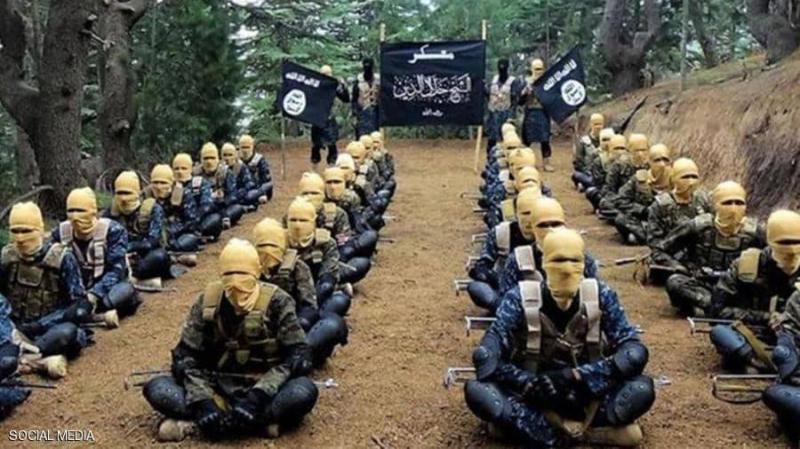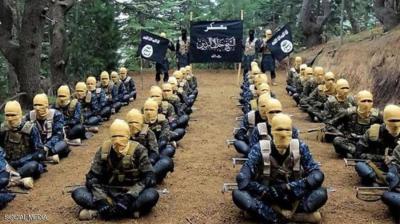Under the title "ISIS Khorasan: The Taliban's Enemy – A Bloodthirsty Organization That Shows No Mercy Even to Children," Sky News Arabia reported that in recent days, the ISIS terrorist organization in Afghanistan has returned to the forefront, starting with warnings of its planned attacks in the capital, Kabul. These attacks soon occurred, resulting in a heavy toll. ISIS in Afghanistan, known as "Khorasan Province," claimed responsibility for the deadly bombings that took place outside Kabul Airport, killing 72 people, including 13 American soldiers.
Two days before the attack, U.S. President Joe Biden warned that every additional day in Afghanistan was a day that "ISIS Khorasan" was planning a terrorist attack on the airport to target American and allied forces, as well as innocent civilians; and this indeed happened.
The organization known as "Khorasan Province" is recognized as the arch-enemy of the Taliban, with the two sides having fought fierce battles in the past. This organization was established in Afghanistan in 2015, carrying an ancient name for Central Asia that includes Afghanistan, according to the American newspaper "New York Post." The terrorist organization has committed atrocities in Afghanistan, including the massacre of 16 people, including two newborns, at a hospital run by Médecins Sans Frontières in Kabul in 2020, as well as an armed attack on Kabul University that same year, resulting in the deaths of 22 students. Additionally, it targeted a girls' school in the Afghan capital with several car bombs, leading to over 40 fatalities.
The branch of ISIS was launched when the organization's leader, Abu Bakr al-Baghdadi, appointed Pakistani Hafiz Saeed Khan, a former fighter in the Pakistani Taliban, as "Amir" of "ISIS Khorasan." Khan had pledged allegiance to al-Baghdadi in 2014, bringing with him several leaders from the Pakistani Taliban. Former Taliban leader Abdul Raouf Khadim served as his deputy.
"Khorasan Province" consists of a mix of militants previously affiliated with armed factions such as the Pakistani Taliban, "Army of Islam" terrorist groups, Afghanistan's "Haqqani Network," the "Lashkar-e-Taiba" group, and extremist movements in Uzbekistan. The number of the organization's militants reached about 3,000 to 4,000 in 2016 during the expansion of the parent organization, ISIS, in Syria and Iraq. However, the organization faced successive military setbacks in Ghazni province, northern Afghanistan, in 2018, according to a United Nations report.
The Center for Strategic Studies indicates that ISIS's capacity in Afghanistan has greatly diminished, with the number of its fighters dropping to between 1,500 and 2,000 in 2018. Despite suffering significant blows and losing many funding sources in 2020, "ISIS Khorasan" still retains military strength in small areas in the eastern provinces of Kunar and Nangarhar. The organization currently operates in a decentralized manner with small cells, similar to those that carried out the attack at Kabul Airport, posing a danger to Afghanistan and the region as a whole, according to a U.S. studies report.
The first leader of "Khorasan Province," Hafiz Khan, was killed along with 30 militants in a U.S. drone strike in 2015. He was succeeded by an individual known as "Abdul Hasib," who was also killed in an Afghan special forces attack in 2017 in Nangarhar province. He is believed to have masterminded the attack on the military hospital in Kabul that year, which resulted in around 50 deaths. His successor, referred to as "Abu Said," lasted only two months in his position before being killed alongside other militants in a U.S. airstrike in Kunar.
Currently, the leader of "ISIS Khorasan," since June 2020, is someone who refers to himself as "the young immigrant," also known as "Sanaaullah." He took over leadership after Afghan special forces captured the previous leader, "Aslam Farooqi." It is believed that "the young immigrant" was a mid-level leader in the "Haqqani Network," and he may still be in touch with this terrorist group.
What is the relationship between ISIS and the Taliban? "ISIS Khorasan" has long considered the Taliban to be non-adherent to "Islamic teachings." Local media reported Thursday a statement, unverified, accusing "ISIS Khorasan" of labeling the Taliban as "partners of the U.S. military" and helping it "evacuate its spies" from Afghanistan. In recent times, the Taliban and "ISIS Khorasan" have exchanged deadly attacks against each other, as the Taliban views ISIS in Afghanistan as a threat.




